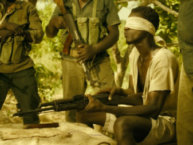 Born in 1987, Jane Tendesayi Nyamandwe is a Business Studies graduate from University of Zimbabwe. She did her primary education at Chancellor Primary School in Mutare. In 2003, when she was in Form Four at Monte Cassino Girls High, she won first prize in the middle category for the My Teacher Poetry Competition held by PTUZ (Progressive Teachers Union of Zimbabwe). She was also a member of the Creative Writers’ Club at Monte Cassino where friends nicknamed her ‘Dambudzo’ and/or ‘Thomas Hardy’. Nyamandwe is inspired by writers Dambudzo Marechera, Ngugi wa Thiongo and Mariama Ba. She currently lives in Bulawayo.
Born in 1987, Jane Tendesayi Nyamandwe is a Business Studies graduate from University of Zimbabwe. She did her primary education at Chancellor Primary School in Mutare. In 2003, when she was in Form Four at Monte Cassino Girls High, she won first prize in the middle category for the My Teacher Poetry Competition held by PTUZ (Progressive Teachers Union of Zimbabwe). She was also a member of the Creative Writers’ Club at Monte Cassino where friends nicknamed her ‘Dambudzo’ and/or ‘Thomas Hardy’. Nyamandwe is inspired by writers Dambudzo Marechera, Ngugi wa Thiongo and Mariama Ba. She currently lives in Bulawayo.
“Hollow Sands” won First Prize in the 2013 WIN-Zimbabwe Short Story Competition.
Hollow Sands
“City! City! City!” touts scream for city-bound customers at this rank where people from all walks of life assemble for reasons only known to themselves. Fourteen-year-old Dzivaidzo, laden with a tattered black bag which houses her few belongings, crouches into a commuter omnibus that stinks of a mixture of diesel, beer and urine. The pungent smell almost suffocates her and she suppresses an instinct to inhale but fails, as evidenced by her distorted face. After battling with the loose seats which unhinge themselves frequently, Dzivaidzo slumps into the back seat and waits for the vehicle to fill-up. The driver’s window is cracked, and the one on the passenger’s side has been replaced by an empty and insubstantial fertilizer bag, which at any time can be utterly ripped off by the wind.
Through the window, she observes young boys, too young to have known the ravages of bread-winning, bellow their lungs out to attract the attention of potential buyers.
“Apples! Bananas! Maputi!” the efficacy with which they shout tells one this is their diurnal song. She wonders if they ever had time for school. One has cracked feet, a feature Dzivaidzo has always associated with the rural areas until now. The other has unkempt, overgrown hair, which he ruffles with his left hand whilst the right one struggles to keep the torn basket containing his merchandise stable. He comes to Dzivaidzo’s window, who involuntarily jerks backwards at the emission of foul breath from his mouth.
“Do I look scary?” he asks.
“No, not at all,” Dzivaidzo replies.
“So why did you just act like I am?”
Dzivaidzo frowns as she realizes this boy is here to stay. He slides his tongue across his front teeth, licks some plaque off his jaw, swallows hard and gives a big, loud yawn.
“I like your eyes,” he says in a soft soothing voice that is unexpected of such a one. Dzivaidzo suddenly slides to the far end of the seat, to avoid more shocking utterances. Her attention is immediately captured by an old man passing by, weary-looking, not due to physical exhaustion but an aura of spiritual and mental fatigue hangs around him.
“Madame, place your baggage in here and I will take you to your terminus,” he pleads with a young woman with a baby suspended rather than strapped on her back.
“Is it free of, o-of charge?” the young woman stammers.
“Why would I be here then my daughter? I only charge two hundred and fifty thousand dollars per trip,” he replies in a faint, cracked voice that only the desperate know.
“Two h-u-n-d-r-e-d aa- and f-iii-f-tee what? Is that the reason, you to- told me to- to place my luggage in there as if it were fff- for ff-free? You see mmm- my nice shoes and you think I’m rrr-rich huh? If you see pp-people who-who can bath well you th-think they have mmm-money huh? Old man, I’m not here to-to bb-be mani-manipulated.”
The baby on her back gives a piercing cry, its only way of telling its mother to be more polite, Dzivaidzo thinks. First, the mother pats it softly, then violently as it wails even more. The old man droops his head and walks away, conscious of the eyes of those who have overheard their conversation.
The young woman fumbles as she struggles to carry her baggage to a bus that looks like it has been panel-beaten outwards to increase its carrying capacity. The advertisement on its outside, of a young boy eating away a slice of bread plastered with Sun jam reminds Dzivaidzo of her empty stomach. The only decent meal she remembers having is the half-burnt, yellow porridge she cooked in a recycled cooking oil gallon last night. She hears a growling sound from the inside and realizes it is her stomach conceding her thoughts. She hopes this sound is only visible to her ears. However, a young man sitting next to her remarks,
“Is that a train passing by?”
He accompanies this statement with a sarcastic chuckle. Dzivaidzo, embarrassed, resuscitates herself from the reverie but is indifferent to this statement.
The omnibus eventually fills up, and the driver ignites the engine. The vehicle is obstinate as testified by its refusal to bow down to the driver’s intentions. Four touts come to the rescue and painstakingly push the vehicle for some distance and finally, it lurches forward, as it belches gases of incomplete combustion from a poorly fitted pipe.
Dzivaidzo is amused by her fellow passengers. In front of her sits a man in the prime of his life. He wears a shirt whose collar has definitely been turned inside out, as its upper part is conspicuously darker than the rest of the faded garment. He clasps a khaki envelope in his hand, which Dzivaidzo assumes contains personal documents as he appears braced for a job interview. His choice of colours is rather dubious. They form a blaring effect that is too loud for an interviewer to award the interviewee any marks.
Next to him sits a young lady who has no qualms for standard dress code. Her thighs jut out of the mini-skirt she wears, which, one can notice, is not the original design but has been outgrown, hence the length. Dangling earrings from her significantly sizeable ears make a rattling sound each time the vehicle jerks forward. She has on a sleeveless top that exposes every scar and imprint her skin has ever met and failed to delete. Her hairstyle could have been better, had it not been for the mixed shades of braid that form a hideous sight of what could have been a decent hairstyle. She struggles to keep her outgrown skirt intact and pulls adamantly, her t-shirt-like top to save herself indecent assault from the male passengers. She, however, loses the battle as scratch marks on her lower back stubbornly glare at the passengers, compelling many to face down, a sheer act of dignity.
Dzivaidzo realizes they are entering the CBD, and has not yet finished counting the numerous five thousand dollar notes she has.
“I told you I don’t want loose money!” barks the conductor. “Next week, this money will be as good as tissue paper.” He grabs the notes from her, scratching her with his brown disfigured nails. Whether this is intentional or not, Dzivaidzo cannot say. He begins to count them unceremoniously, handing Dzivaidzo a batch of notes, of even lesser value, as change. She casually puts them in a plastic bag she has converted into a handbag and is not at all worried about the mathematical accuracy of the conductor.
Upon arrival at the rank, the girl aged fourteen disembarks, confusion a conspicuous feature on her face. It becomes apparent her shoddy black bag, embarrassing though it seems, outcompetes those of other individuals in the bus terminus. She wonders whether the contents could also surpass theirs. She wades through the rubbish that causes an eyesore to what was once the city of bright lights. Mazhanje peeps and peels flood the place, giving it a sickening stench. Sewage water oozes out of a burst pie behind a public toilet that worsens the odor engulfing the place. Dzivaidzo is grateful for her empty stomach as she evades an inkling to visit the toilet where more insults to the eye could have been availed.
A woman burdened with an abnormal load talks to herself in a high-pitched voice, speaking incomprehensible utterances. She begins to sing a song Dzivaidzo is familiar with and could have joined her in a dance had it not been for the chasm that separates sanity and insanity. Her stomach groans again, so loud that it overrides the sounds of the chanting woman.
A few meters from Dzivaidzo is a middle-aged woman selling all kinds of merchandise. She buys a packet of masawu from this lady, whose vendor-table looks like a troop of baboons has rummaged into it. Flies swarm around a watermelon that has been cut into halves to award each customer a chance to taste. A stone’s throw away, a boy about three years of age relieves himself and the flies that feast on his waste make a trip to the water melon on the offer for free consumption. When the boy finishes defecating, he carelessly pulls up his torn shorts without much thought for his fece-coated buttocks, thus, attracting a greater sum of flies than his newly deposited waste.
Dzavaidzo is last to enter the second kombi and sits on the tiny space behind the driver’s seat, face to face with the others. Her heart sinks, being the shy girl she is. She assumes rural marks and engravings are visible to those to whom she has been offered as an object of scrutiny. Her legs are interlocked with those of a young man, still in his bachelorhood at first glance, who manipulates the situation to his pleasure. He keeps nudging her with his knee, and gives a weak smile that awards him a cunning look. Dzivaidzo has no choice but to endure stoically this childish teasing as the young man is unwilling to relent.
The other passengers ogle at her as she makes her journey to Tichafa high-density suburb to see her only sibling, Tariro and their grandmother, Mbuya Hondo.
She timidly stuffs masawu fruits into her mouth, her gaze fixed on the young man’s toes that peep through his tattered shoes. Her cheeks swell, to accommodate the inconsistent and hurried supply of fruit. She tries chewing steadily but is overwhelmed by the amount she has ingested. The seeds begin to spill out and saliva from the sides of her mouth drools uncontrollably, forcing the young man to quickly withdraw his knee as it is an immediate destination of these substances. She abruptly unfolds her plastic-cum-handbag and spews the full contents of her mouth therein. Dzivaidzo belches, bringing to remembrance the taste and smell of yellow porridge. If only she had packed some in that empty Vaseline container she keeps on the kitchen window sill.
She informs the driver of her intention to alight at the first bus stop when she reads the post “ichafa.” The “T” on the post has flaked off and a blurred shadow of the letter remains to conserve the original name.
As always, she opts for the shorter route, contemplating what her grandmother might have prepared for her to conquer her hunger. The young girl trudges along the narrow dusty road that leads to her grandmother’s place, her grumbling stomach reminding her she is still among the living. Upon arrival, a feeling of nausea haunts her. She spits frequently to which Mbuya Hondo jests,
“The short-cut you used is everybody’s toilet my dear, rather use the main road next time.” She laughs. “I can see your photographic memory is betraying you.”
Dzivaidzo is not at all amused by her grandmother’s sense of humor. She begins to vomit vehemently and Mbuya Hondo realizes this is no joking matter. Within sixty seconds, Dzivaidzo is in the bathroom, excreting white-rice stool incessantly.
The combination of vomit and stool gives a repulsive sight that compels Mbuya Hondo to quell an involuntary desire to throw up as well. Dzivadzo gives heart-wrenching shrieks as it dawns upon her that providence has taken its toll. She had contracted THAT disease. Mrs. Nhamo, her teacher, lectured them on the signs and symptoms of THAT disease. The entrance to their classroom had posters and stickers that told the tale of the pandemic. She read them out of curiosity and listened to her tutor from a lack a better alternative to lend her ears to. She never imagined herself as the victim.
Mbuya Hondo runs next door, where they had a funeral the previous week to bid farewell to one who had been made extinct by the outbreak. She recalls awakening in the middle of the night to bouts of wails and screeches that imparted the pathetic news that one they were familiar with had bade them a silent farewell. Due to incessant power cuts, their globe that hung precariously from a cranked up wire had burst that night, plunging them into utter darkness. She had felt her way to the door, stumbling over containers of water that formed a reservoir from which their thirst was quenched. Their broken door which offers more than adequate security to their few belongings flung open and shoved her into the world of the heartbroken and bereaved. Such was beyond her faintest imagination that within seven days, her heart would be throbbing at the possibility of losing her own to the same scourge.
“My Dziva is dying, she is dying. Come save her,” Mbuya Hondo sobs. In between her statements, she wails in a manner that speaks of a woman nurturing very little hope. She fails to realize she is walking on bare feet, posing herself as yet another candidate for the attack that has drawn a thin line between life and death for her grandchild.
Mai Shingai and her son, with hearts heavy from their own loss, scurry to Mbuya Hondo’s one room, to salvage Dzivaidzo’s little soul.
Mai Shingai rushes to the nearby shopping center to find a vehicle to ferry Dzivaidzo to Rugare Hospital. The fuel station has since shut down and has become a recreational place for the never-employed and formerly employed, who smoke their problems away and rail insults at female passersby.
There is an erratic supply of paraffin that gives the shopping center some business activity and enlivens the place about twice a week, giving the lean storekeeper in the kiosk a flimsy reason to stand behind the counter of an empty shop all day.
They hire an old-battered car from the garage.
The journey to the hospital is the longest Dzivaidzo has ever taken. Tariro remains a major preoccupation in her mind. Where is she? She would have loved to sit next to her, tell her about that boy at the grinding store they constantly made fun, and reminisce about their childhood before Tariro migrated to the city.
They eventually arrive at their destination. The hospital assumes the status of a squatter camp. Patients lying motionless on tattered mattresses and blankets are perceptible upon entering the premises. Drips hang from the trees, dissuading one from entering the wards for outside evidence gives one ample conviction that these have been choked beyond capacity. Health personnel exchange surgical gloves as they hop from one patient to another. They remain unmoved by Dzivaidzo’s condition.
Dzivaidzo is hesitant to open her eyes lest she is confronted with a ghastly sight of a haunted cemetery. She hears a voice so sweet to her ears and wonders if it is an angel. She opens her eyes and comes face to face with Tariro. She asks herself, “Is it a reunion or a farewell?”….






3 comments for “Hollow Sands by Jane Tendesayi Nyamandwe”